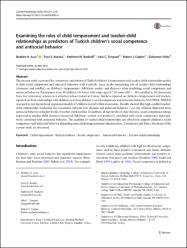| dc.contributor.author | Acar, İbrahim Hakkı | |
| dc.contributor.author | Kutaka, Traci Shizu | |
| dc.contributor.author | Rudasill, Kathleen Moritz | |
| dc.contributor.author | Torquati, Julia | |
| dc.contributor.author | Coplan, Robert J. | |
| dc.contributor.author | Yıldız, Süleyman | |
| dc.date.accessioned | 2020-11-20T10:07:22Z | |
| dc.date.available | 2020-11-20T10:07:22Z | |
| dc.date.issued | 2020 | en_US |
| dc.identifier.citation | Acar, İ. H., Kutaka, T. S., Rudasill, K. M., Torquati, J., Coplan, R. J. ve Yıldız, S. (2020). Examining the roles of child temperament and teacher-child relationships as predictors of Turkish children's social competence and antisocial behavior. Current Psychology, 39(6), 2231-2245. https://dx.doi.org/10.1007/s12144-018-9901-z | en_US |
| dc.identifier.issn | 1046-1310 | |
| dc.identifier.issn | 1936-4733 | |
| dc.identifier.uri | https://dx.doi.org/10.1007/s12144-018-9901-z | |
| dc.identifier.uri | https://hdl.handle.net/20.500.12511/6040 | |
| dc.description.abstract | The present study examined the concurrent contribution of Turkish children's temperament and teacher-child relationship quality to their social competence and antisocial behavior, with a specific focus on the moderating role of teacher-child relationships (closeness and conflict) on children's temperament (inhibitory control and shyness) when predicting social competence and antisocial behavior. Participants were 94 children (56 boys) with mean age of 7.05 years (SD = .88) enrolled in 24 classrooms from five elementary schools in a suburban school district in Turkey. Mothers reported on children's temperament and teachers reported on their relationships with children as well as children's social competence and antisocial behavior. SAS PROC MIXED was used to test hierarchical regression models of children nested within classrooms. Results showed that high conflict teacher-child relationships moderated the association between low shyness and antisocial behavior. Less shy children displayed more antisocial behavior at higher levels of teacher-child conflict. In addition, at high levels of child shyness, social competence ratings improved as teacher-child closeness increased. Inhibitory control was positively correlated with social competence and negatively correlated with antisocial behavior. The qualities of teacher-child relationships can effectively support children's social competence and antisocial behavior depending upon their temperamental characteristics. Limitations and future directions of the current study are discussed. | en_US |
| dc.language.iso | eng | en_US |
| dc.publisher | Springer | en_US |
| dc.rights | info:eu-repo/semantics/openAccess | en_US |
| dc.subject | Child Temperament | en_US |
| dc.subject | Turkish Children | en_US |
| dc.subject | Social Competence | en_US |
| dc.subject | Antisocial Behavior | en_US |
| dc.subject | Teacher-Child Relationship | en_US |
| dc.title | Examining the roles of child temperament and teacher-child relationships as predictors of Turkish children's social competence and antisocial behavior | en_US |
| dc.type | article | en_US |
| dc.relation.ispartof | Current Psychology | en_US |
| dc.department | İstanbul Medipol Üniversitesi, Eğitim Fakültesi, Temel Eğitim | en_US |
| dc.authorid | 0000-0003-4007-5691 | en_US |
| dc.identifier.volume | 39 | en_US |
| dc.identifier.issue | 6 | en_US |
| dc.identifier.startpage | 2231 | en_US |
| dc.identifier.endpage | 2245 | en_US |
| dc.relation.publicationcategory | Makale - Uluslararası Hakemli Dergi - Kurum Öğretim Elemanı | en_US |
| dc.identifier.doi | 10.1007/s12144-018-9901-z | en_US |
| dc.identifier.wosquality | Q1 | en_US |
| dc.identifier.scopusquality | Q2 | en_US |


















